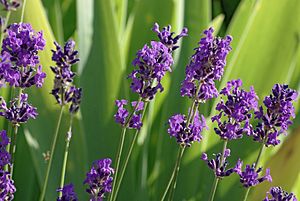Note: This is a project under development. The articles on this wiki are just being initiated and broadly incomplete. You can Help creating new pages.
Difference between revisions of "Lavandula angustifolia - Lavender"
(Created page with "thumb|right|''Lavandula angustifolia'' '''Lavandula angustifolia''' (lavender most commonly True Lavender or English lavender,<ref name="int/...") |
(No difference)
|
Revision as of 14:43, 6 January 2017
Lavandula angustifolia (lavender most commonly True Lavender or English lavender,[1]though not native to England ;also garden lavender, common lavender, narrow-leaved lavender), formerly L. officinalis, is a flowering plant in the family Lamiaceae, native to the Mediterranean (Spain, France, Italy, Croatia etc.)
Contents
Description
It is a strongly aromatic shrub growing as high as 1 to 2 metres (3.3 to 6.6 ft) tall. The leaves are evergreen, 2–6 centimetres (0.79–2.36 in) long, and 4–6 millimetres (0.16–0.24 in) broad. The flowers are pinkish-purple (lavender-coloured), produced on spikes 2–8 cm (0.79–3.15 in) long at the top of slender, leafless stems 10–30 cm (3.9–11.8 in) long. It does not grow well in continuously damp soil.
Uses
- English lavender is commonly grown as an ornamental plant. It is popular for its colourful flowers, its fragrance and its ability to survive with low water consumption.
- The flowers and leaves are used as an herbal medicine, either in the form of lavender oil or as an herbal tea.
- Lavender essential oil, when diluted with a carrier oil, is commonly used as a relaxant with massage therapy. Products for home use, such as lotions, eye pillows (including lavender flowers or the essential oil itself) and bath oils, etc., are also used. Both the petals and the oil are the most popular ingredients in handmade soap.
- Dried lavender flowers and lavender essential oil are also used as a prevention against clothing moths, which do not like their scent.(clarification needed)
